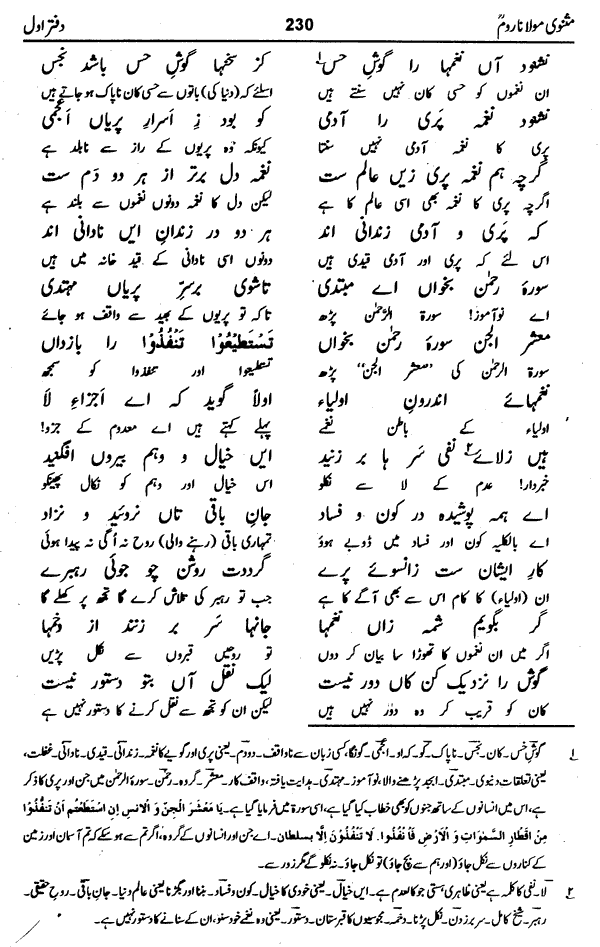The story of the old harper who in the time of ‘Umar, may God be well-pleased with him, on a day when he was starving played the harp for God's sake in the graveyard.
Hast thou heard that in the time of ‘Umar there was a harper, a fine and glorious minstrel?
The nightingale would be made beside herself by his voice: by his beautiful voice one rapture would be turned into a hundred.
1915. His breath was an ornament to assembly and congregation, and at his song the dead would arise.
(He was) like Isráfíl (Seraphiel), whose voice will cunningly bring the souls of the dead into their bodies,
Or he was (like) an accompanist to Isráfíl, for his music would make the elephant grow wings.
One day Isráfíl will make a shrill sound and will give life to him that has been rotten for a hundred years.
The prophets also have (spiritual) notes within, whence there comes life beyond price to them that seek (God).
1920. The sensual ear does not hear those notes, for the sensual ear is defiled by iniquities.
The note of the peri is not heard by man, for he is unable to apprehend the mysteries of the peris,
Although the note of the peri too belongs to this world. The note of the heart is higher than both breaths (notes),
For peri and man (alike) are prisoners: both are (captive) in the prison of this ignorance.
Recite O community of Jinn (and men) in the Súratu l’-Rahmán; recognise (the meaning of) if ye be able to pass forth.
1925. The inward notes of the saints say, at first, “O ye particles of lá (not=not-being),
Take heed, lift up your heads from the lá of negation, put forth your heads from this fancy and vain imagining.
O ye who all are rotten in (the world of) generation and corruption, your everlasting soul neither grew nor came to birth.”
If I tell (even) a tittle of those (saintly) notes, the souls will lift up their heads from the tombs.
Put thine ear close, for that (melody) is not far off, but ’tis not permitted to convey it to thee.
1930. Hark! for the saints are the Isráfíls of the (present) time: from them to the dead comes life and freshness.
At their voice the dead souls in the body's grave start up in their winding-sheets.
He (that is thus awakened) says, “This voice is separate from (all other) voices: to quicken (the dead) is the work of the voice of God.
We (had) died and were entirely decayed: the call of God came: we all arose.”
The call of God, (whether it be) veiled or unveiled, bestows that which He bestowed on Mary from His bosom.
1935. O ye who are rotten with death (in your hearts) underneath the skin, return from non-existence at the voice of the Friend!
Absolutely, indeed, that voice is from the King (God), though it be from the larynx of God's servant.
He (God) has said to him (the saint), “I am thy tongue and eye; I am thy senses and I am thy good pleasure and thy wrath.
Go, for thou art (he of whom God saith), ‘By Me he hears and by Me he sees’: thou art the (Divine) consciousness (itself):
what is the occasion (propriety) of (saying), ‘Thou art the possessor of the (Divine) consciousness’?
Since thou hast become, through bewilderment, ‘He that belongs to God,’ I am thine, for ‘God shall belong to him.’
1940. Sometimes I say to thee, ‘’Tis thou,’ sometimes, ‘’Tis I’: whatever I say, I am the Sun illuminating (all).
Wheresoever I shine forth from the lamp-niche of a breath (Divine word), there the difficulties of a (whole) world are resolved.
The darkness which the (earthly) sun did not remove, through My breath that darkness becomes like bright morning.”
To an Adam He in His own person showed the (Divine) Names; to the rest He was revealing the Names by means of Adam.
Do thou receive His light either from Adam or from Himself: take the wine either from the jar or from the gourd (cup),
1945. For this gourd is very closely connected with the jar: the blessed gourd is not rejoiced (by the same causes) as thou art.
Mustafá (Mohammed) said, “Happy he that has seen me and he that looks at him that saw my face.”
When a lamp has derived (its) light from a candle, every one that sees it (the lamp) certainly sees the candle.
If transmission (of the light) occurs in this way till a hundred lamps (are lighted), the seeing of the last (lamp) becomes a meeting with the original (light).
Either take with (all) thy soul from the hindmost light—there is no difference—or from the candelabrum.
1950. Either behold the light (of God) from the lamp of the last (saints), or behold His light from the candle of those who have gone before.





No comments:
Post a Comment